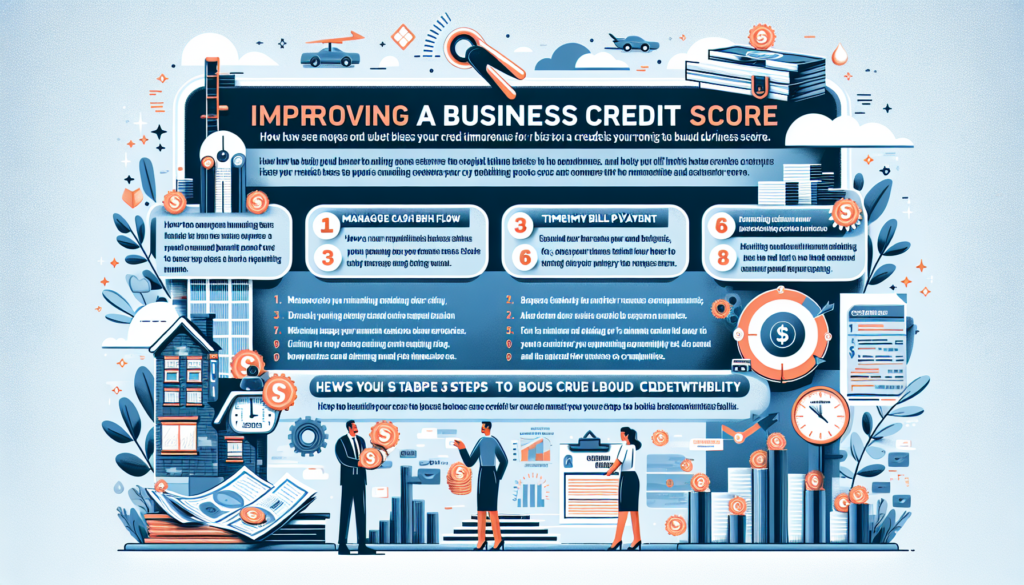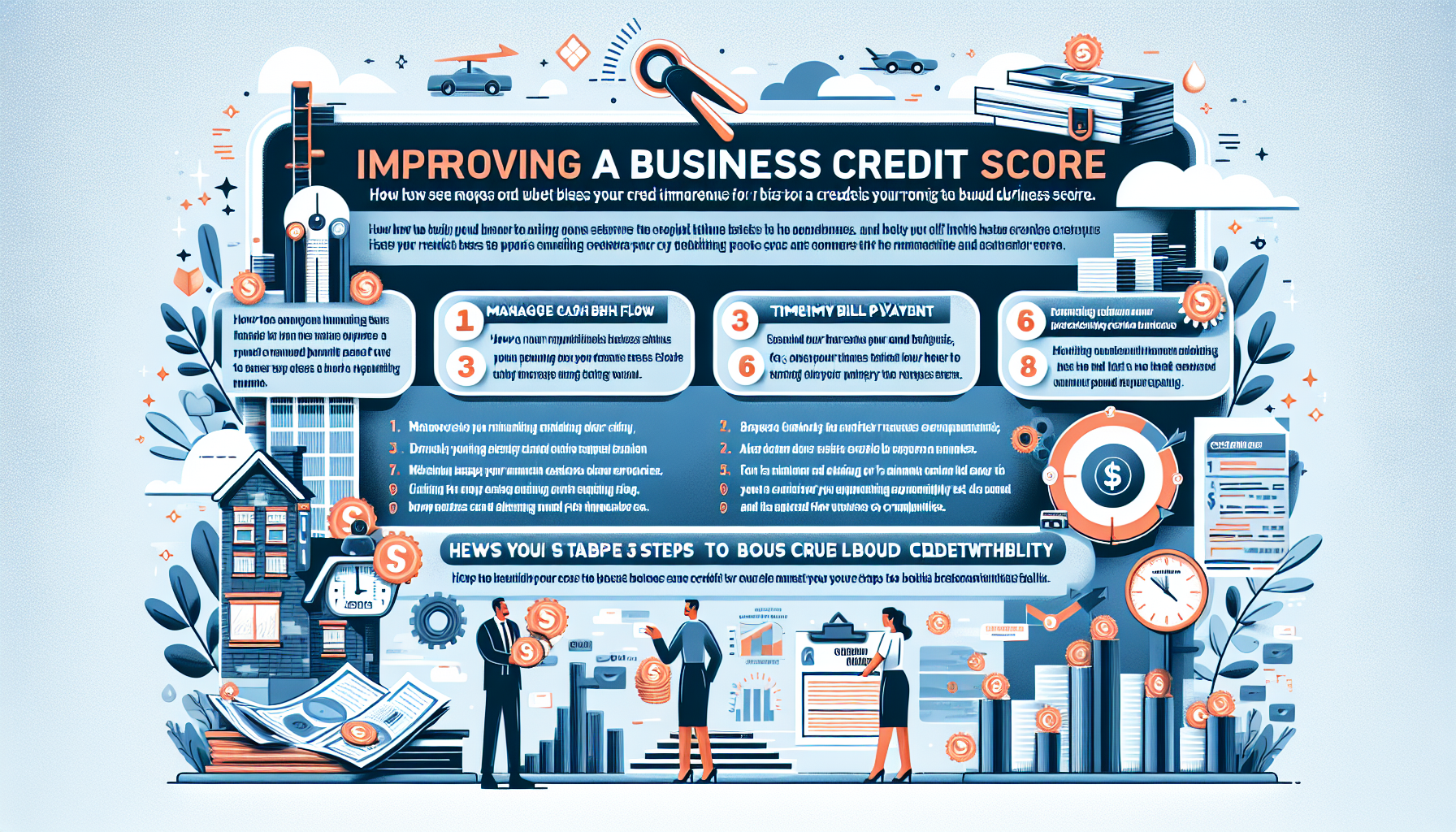If you’re a business owner, it’s crucial to understand the importance of a strong credit score for your company. A good business credit score can open doors to better financing options, higher credit limits, and improved relationships with suppliers. But the question remains: how can you improve your business credit score? Well, the answer lies in a combination of smart financial management and strategic credit-building practices. In this article, we will explore some effective tips and strategies that can help you boost your business credit score and set your company up for success. So, let’s dive in and discover the path to a better credit score for your business.

Understanding Business Credit
What is a business credit score?
A business credit score is a numerical representation of a company’s creditworthiness. It indicates to lenders and suppliers the likelihood of the business repaying its debts and obligations on time. Just like personal credit scores, business credit scores are important for establishing trust and securing favorable terms for loans, trade credit, and other financial transactions.
Why is a business credit score important?
a business credit score is vital because it serves as a measure of financial stability and responsibility. Lenders and suppliers use this score to assess the risk of doing business with a company. A strong credit score can open doors to financing options at lower interest rates, better trade credit terms, and improved relationships with vendors. It also helps businesses establish credibility in the marketplace and enhances their chances of securing contracts and partnerships.
How is a business credit score calculated?
Several factors contribute to the calculation of a business credit score. Typically, credit bureaus consider factors such as payment history, credit utilization, length of credit history, public records, and any past defaults or bankruptcies. The scores are usually calculated on a scale ranging from 0 to 100 or 0 to 300, depending on the credit bureau. The higher the score, the better the creditworthiness of the business.
What factors affect a business credit score?
Several key factors influence a business credit score. Timely payments, the length of credit history, and the business’s debt-to-asset ratio are all vital considerations. Additionally, the type of credit accounts, such as credit cards, loans, and trade credit, also impact the score. It’s essential to maintain a low credit utilization ratio and avoid maxing out credit limits. Public records, like bankruptcies or liens, can significantly harm a business credit score, so it’s crucial to steer clear of any legal or financial issues.
Obtain and Review Credit Reports
Importance of obtaining credit reports
Obtaining credit reports is a critical step in understanding and managing your business credit. Credit reports provide detailed information about your credit history, including payment patterns, outstanding debts, and public records. By reviewing these reports, you can gain insights into your creditworthiness, identify potential issues, and take appropriate actions to improve your business credit score.
Checking for errors or inaccuracies
When reviewing credit reports, it’s important to carefully check for errors or inaccuracies. Mistakes on credit reports can have a significant impact on your business credit score. Look for discrepancies in payment records, outstanding balances, or any incorrect information related to your business. If you find any errors, it’s crucial to dispute them promptly with the respective credit reporting agency to ensure an accurate representation of your creditworthiness.
Disputing incorrect information
If you identify any incorrect information on your credit report, you have the right to dispute it. Contact the credit reporting agency in writing and provide detailed information explaining the error. Include any supporting documents, such as payment receipts or contracts, that prove the inaccuracies. The credit reporting agency has a legal obligation to investigate your dispute and make any necessary corrections within a reasonable timeframe.
Regularly monitoring credit reports
Regular monitoring of your business credit reports is essential in maintaining a healthy credit profile. By monitoring your reports, you can track any changes, spot potential issues early on, and ensure the accuracy of your credit history. Consider utilizing credit monitoring services that send alerts whenever there are updates or inquiries on your credit reports. Monitoring your credit reports on a regular basis allows you to proactively address any concerns and keep your business credit score in good standing.
Establishing a Solid Foundation
Incorporating your business
One crucial step in establishing a strong business credit profile is incorporating your business. Forming a legal entity, such as a limited liability company (LLC) or a corporation, separates your personal finances from your business finances, providing an added layer of protection and legitimacy. Incorporating your business also helps build credibility with lenders and suppliers, signaling that you are committed to operating as a separate entity and are more likely to fulfill your financial obligations.
Obtaining a federal tax ID number
Obtaining a federal tax ID number, also known as an Employer Identification Number (EIN), is essential for building business credit. This unique identifier is assigned by the Internal Revenue Service (IRS) and helps establish your business as a legitimate entity. Lenders and credit reporting agencies often require an EIN when reviewing credit applications or reporting credit information. Applying for an EIN is a straightforward process and can be done online through the IRS website.
Separating personal and business finances
To build a strong business credit profile, it is crucial to separate personal and business finances. Open dedicated business bank accounts and credit cards to distinguish your business’s financial activities from your personal transactions. Mixing personal and business finances can lead to confusion and hinder accurate reporting of credit activities. By separating these two realms, you demonstrate financial responsibility and establish a solid foundation for your business creditworthiness.
Opening a business bank account
Opening a business bank account is an essential step in managing your business finances effectively. It allows you to keep track of income and expenses dedicated solely to your business. A business bank account also provides a clear record of financial transactions, making it easier to demonstrate financial stability and manage cash flow. Lenders and credit reporting agencies often consider the existence and activity of a business bank account as an indicator of financial responsibility.
Getting a business phone line
Having a dedicated business phone line is another aspect of establishing a solid foundation for your business credit. A separate phone line demonstrates professionalism and confirms that your business has a physical presence. It also makes it easier for lenders and suppliers to verify your business information and contact you directly. By having a business phone line, you enhance your business’s legitimacy and reliability, which can positively impact your creditworthiness.
Setting up a business address
A physical business address is an essential element in building a strong business credit profile. It adds credibility and legitimacy to your business, especially if you operate from a commercial location. If you work from home, consider securing a virtual office or mailbox service to establish a separate address for your business. A business address enables lenders and suppliers to verify your business’s location and stability, which can positively influence your business creditworthiness.

Making Timely Payments
Understanding payment history impact
Payment history plays a significant role in determining your business credit score. Timely payments strengthen your creditworthiness and demonstrate your ability to fulfill financial obligations. On the other hand, late payments or defaults can have a detrimental effect on your business credit score. Lenders and credit reporting agencies closely evaluate payment patterns to assess the risk associated with extending credit to your business. Consistently making timely payments is crucial for maintaining a positive payment history.
Paying bills and invoices on time
To maintain a positive payment history, it is essential to pay all bills and invoices on time. This includes payments to vendors, suppliers, and service providers. Implement effective invoicing and payment systems, ensuring that payments are sent promptly upon receipt of an invoice. Late payments can negatively impact your relationships with suppliers and may result in additional fees or penalties. Prioritize timely payments to build a strong payment history and improve your business credit score.
Negotiating payment terms
In certain situations, negotiating payment terms with creditors can be beneficial for your business credit. If cash flow is tight, reaching out to suppliers, lenders, or service providers to discuss modified payment terms may help alleviate financial strain. Creditors may be willing to offer extended payment terms, reduced interest rates, or alternative payment arrangements. It is important to communicate openly and honestly about your business’s financial situation and provide a realistic repayment plan. Successful negotiation of payment terms can help you fulfill obligations and avoid any negative impact on your business credit score.
Automating payments
Automating your business payments can greatly assist in maintaining timely payments and improving your business credit score. Set up automatic payments for recurring bills and invoices. This ensures that payments are made on time, even if you are busy or forgetful. Automation minimizes the risk of late payments and helps establish a consistent payment history. Be sure to maintain sufficient funds in your business bank account to cover the automated payments and regularly review your payment schedule to ensure accuracy.
Handling disputes or issues promptly
Addressing any disputes or issues regarding payments promptly is crucial to maintaining a positive payment history. If you encounter discrepancies, billing errors, or issues with service quality, address them immediately and directly with the concerned parties. Communicate your concerns and work towards resolving the issues amicably. Promptly resolving disputes prevents them from escalating and potentially affecting your business credit score. It also demonstrates your commitment to honoring financial obligations and maintaining strong business relationships.
Building Positive Payment History
Building relationships with suppliers and vendors
Building strong relationships with suppliers and vendors is essential for not only maintaining a steady supply chain but also for improving your business credit. Strive for timely communication, prompt payments, and loyalty to foster positive relationships. By consistently fulfilling your financial obligations, you enhance your reputation as a reliable business partner. Strong relationships can lead to favorable credit terms and increased trade credit, which positively impact your business credit score.
Using business credit cards responsibly
Business credit cards can be valuable tools for building positive payment history and improving your business credit score. Use them responsibly, making regular purchases and paying off the balances in full and on time. This demonstrates your ability to manage credit effectively and contributes to a positive payment history. Be mindful of credit limits and aim for a low credit utilization ratio (the percentage of available credit you are using) to maintain a healthy credit profile.
Regularly using and paying off credit accounts
Consistently using and paying off your credit accounts helps establish a positive payment history and demonstrates your ability to handle credit responsibly. Utilize credit lines, such as loans or credit cards, to make essential business purchases or cover expenses strategically. Make timely payments and pay off the balances promptly. This showcases your financial discipline and helps strengthen your business creditworthiness over time.
Establishing trade credit with suppliers
Establishing trade credit with suppliers is another effective strategy for building positive payment history. Trade credit refers to agreements with suppliers allowing you to purchase goods or services on credit terms, typically with a specified payment period. When suppliers report these trade credit arrangements to credit reporting agencies, it positively impacts your business credit score. Consistently fulfilling trade credit obligations and managing them responsibly can significantly enhance your business credit profile.
Maintaining a low credit utilization ratio
Maintaining a low credit utilization ratio is crucial for improving your business credit score. This ratio represents the percentage of your available credit that you are currently using. Aim to keep your credit utilization ratio below 30% to demonstrate responsible credit usage. Regularly pay down credit card balances and avoid maxing out credit limits. By maintaining a low credit utilization ratio, you show creditors and lenders that you are not overly reliant on credit and can manage your finances effectively.
Diversifying Credit Accounts
Types of credit accounts
Diversifying your credit accounts involves having a variety of credit types, such as credit cards, lines of credit, and loans. Each type of credit account has its own benefits and may be suitable for different business needs. Credit cards offer flexibility and convenience, while lines of credit can provide ongoing access to funds. Loans, on the other hand, are typically used for larger investments or business expansions. By diversifying your credit accounts, you demonstrate your ability to handle different types of credit, which positively impacts your business creditworthiness.
Benefits of diversifying credit
Diversifying credit brings several benefits to your business. It reduces your reliance on a single credit source, mitigating the risk associated with potential changes or limitations in that source. By having multiple credit accounts, you increase your available credit and improve your credit utilization ratio. Additionally, diversification enhances your credit mix, which is a factor considered in credit scoring models. Having a mix of credit types demonstrates your ability to handle different financial obligations, bolstering your business creditworthiness.
Opening and managing various credit accounts
To diversify your credit accounts, consider opening and managing various credit accounts that suit your business’s needs. Research and compare different credit options, such as business credit cards, lines of credit, or loans. Carefully evaluate the terms, fees, and interest rates associated with each credit account to ensure they align with your financial goals. Once you open the accounts, manage them responsibly by making payments on time, keeping utilization low, and utilizing credit strategically to build a strong credit profile.
Avoiding reliance on a single credit source
Over-reliance on a single credit source can be detrimental to your business creditworthiness. Depending solely on one credit account or financial institution exposes your business to risks if that source becomes unavailable or changes its lending practices. By diversifying your credit sources, you create backup options and maintain access to credit even if one source becomes limited. This prudent approach strengthens your business’s financial stability and enhances your business credit score.
Managing Debt Levels
Understanding debt utilization ratio
The debt utilization ratio measures the amount of debt your business has in relation to its available credit. It is calculated by dividing the total debt by the total credit limit and is expressed as a percentage. Lenders consider this ratio when assessing your business’s creditworthiness. A high debt utilization ratio suggests a heavy reliance on credit and may indicate financial strain. Managing your debt levels and maintaining a low debt utilization ratio are crucial for improving your business credit score.
Paying down existing debts
Paying down existing debts is an effective strategy for managing your business’s debt levels. Evaluate your outstanding debts and prioritize repayment based on interest rates, due dates, and terms. Develop a repayment plan that allows you to consistently and responsibly reduce your debts. Make timely payments and consider allocating additional funds to accelerate the debt repayment process. By effectively managing and paying down debts, you demonstrate financial responsibility and improve your business creditworthiness.
Avoiding over-reliance on credit
Over-reliance on credit can negatively impact your business credit score and hinder your financial stability. While credit can provide necessary funds for business operations and growth, it is important to avoid excessive borrowing. Always assess the viability of utilizing credit versus other financial resources, such as retained earnings or investors. By minimizing your reliance on credit and strategically managing your finances, you can maintain a healthy balance between credit utilization and financial stability.
Monitoring debt-to-income ratio
Monitoring your business’s debt-to-income (DTI) ratio is essential for managing your overall debt levels effectively. The DTI ratio is calculated by dividing your total monthly debt payments by your monthly income. Monitoring this ratio allows you to understand the affordability of your debt obligations and avoid taking on more debt than your business can handle. Aim for a low DTI ratio to demonstrate your ability to manage debt responsibly. By regularly assessing and monitoring this ratio, you can make informed decisions regarding debt management and improve your business credit score.
Limiting New Credit Applications
Understanding credit inquiries
A credit inquiry occurs when a lender or creditor examines your credit history in response to a credit application. There are two types of credit inquiries: hard inquiries and soft inquiries. Hard inquiries are initiated by your explicit credit application and can impact your credit score. Soft inquiries occur when your credit report is reviewed for promotional or pre-approval purposes and do not affect your credit score. Understanding the difference between these inquiries is essential for managing your credit applications effectively.
Effect of multiple credit applications
Applying for multiple credit accounts within a short period can negatively impact your business credit score. Each credit application triggers a hard inquiry, which temporarily lowers your credit score. Lenders may interpret multiple credit applications as a sign of financial stress or potential overextension of credit. It is important to limit the number of credit applications and only apply for credit when necessary. Instead of applying for several credit accounts simultaneously, assess your needs, prioritize, and strategically apply for credit when it aligns with your business goals.
Only applying for necessary credit
To maintain a positive business credit profile, it is important to apply for credit only when necessary. Carefully evaluate your business’s financial needs and consider whether borrowing is the best solution. Avoid applying for credit accounts simply to increase available credit or to hold excess funds. Prioritize your financial goals and analyze the potential impact of each credit application on your business creditworthiness. Only apply for credit when it aligns with your business’s strategic objectives and financial capabilities.
Spacing out credit applications
Spacing out credit applications is a prudent approach to manage new credit inquiries and maintain a healthy business credit score. Rather than applying for multiple credit accounts simultaneously, consider spacing out the applications. Applying for credit at regular intervals gives potential lenders a more accurate representation of your credit-seeking behavior. Spacing out the applications also allows you to effectively manage any new credit you obtain and ensures that you can fulfill the repayment obligations without overextending your business’s financial resources.
Maintaining Long-Term Relationships
Building strong relationships with lenders
Developing strong relationships with lenders is instrumental in maintaining a positive business credit profile. Cultivate open lines of communication, transparency, and trust with your lenders. Regularly update them on your business’s performance, financial stability, and growth plans. Building personal connections with your lenders allows you to discuss any challenges or opportunities that may arise and explore potential solutions together. Strong relationships with lenders can lead to more favorable credit terms, increased credit limits, and improved business creditworthiness.
Longevity of credit accounts
The longevity of your credit accounts plays a significant role in improving your business credit score. Lenders and credit reporting agencies consider the length of your credit history to assess your creditworthiness. Maintaining credit accounts and using them responsibly over an extended period demonstrates your ability to manage credit consistently. Avoid closing old and inactive credit accounts unless necessary, as they contribute valuable history to your credit profile. Longevity of credit accounts indicates stability and enhances your business creditworthiness.
Requesting credit limit increases
As your business grows and establishes a positive credit history, you may consider requesting credit limit increases on your existing credit accounts. Requesting a higher credit limit demonstrates your ability to handle larger financial obligations and showcases the confidence of your creditors in your business. A higher credit limit can improve your credit utilization ratio, positively impacting your business credit score. Before requesting an increase, ensure that your business’s financials support the need for additional credit and that you can manage higher credit limits responsibly.
Communicating effectively with creditors
Effective communication with creditors is essential for maintaining long-term relationships and ensuring accurate reporting of your credit activities. Promptly respond to any communication from creditors and keep them informed of any changes or challenges your business may be facing. If you anticipate difficulty in making a payment, reach out to creditors proactively to discuss possible solutions. By transparently communicating with your creditors, you establish trust and mutual understanding, which can help preserve your business’s reputation and creditworthiness.
Seeking Professional Help
Hiring a credit repair specialist
If you are struggling to improve your business credit score or facing difficulties in managing your credit, you may consider hiring a credit repair specialist. These professionals are experienced in navigating credit reporting systems, identifying inaccuracies, and developing strategies to improve your creditworthiness. A credit repair specialist can guide you through the process of disputing errors on your credit report, negotiating with creditors, and implementing effective credit management practices tailored to your business’s needs.
Consulting with financial advisors
Financial advisors can provide valuable guidance and insights into managing your business credit. These professionals have a deep understanding of financial matters and can help you develop a comprehensive credit improvement plan. They can assess your business’s financial health, analyze your credit reports, and recommend strategies to strengthen your credit profile. Financial advisors also offer advice on improving cash flow, managing debt, and optimizing your financial operations, all of which contribute to better business creditworthiness.
Seeking guidance from business mentors
Business mentors, especially those with experience in credit and finance, can offer invaluable advice and support in improving your business credit score. Seek out mentors who have successfully navigated the challenges of building and managing business credit. Their insights and guidance can help you understand industry-specific credit practices, establish strategic relationships, and make informed decisions regarding credit management. Surrounding yourself with experienced mentors provides a network of knowledge and support as you improve your business creditworthiness.
Attending workshops or seminars
Attending workshops or seminars on business credit can provide you with additional knowledge and strategies to improve your creditworthiness. Look for events hosted by reputable credit organizations, financial institutions, or industry associations. These events often feature experts who present on topics such as credit management, credit scoring models, and credit improvement techniques. Participating in these educational opportunities allows you to learn from industry professionals and gain insights that can be directly applied to your business credit management practices.
In conclusion, understanding business credit is essential for every business owner. By comprehending the importance of a business credit score, how it is calculated, and the factors that influence it, you can take proactive steps to improve your creditworthiness. Obtaining and reviewing credit reports, establishing a solid foundation, making timely payments, building positive payment history, diversifying credit accounts, managing debt levels, limiting new credit applications, maintaining long-term relationships, and seeking professional help are all crucial components of improving and maintaining a strong business credit profile. By following these strategies and consistently managing your business credit, you enhance your financial stability, gain access to better financing options, and position your business for long-term success.

